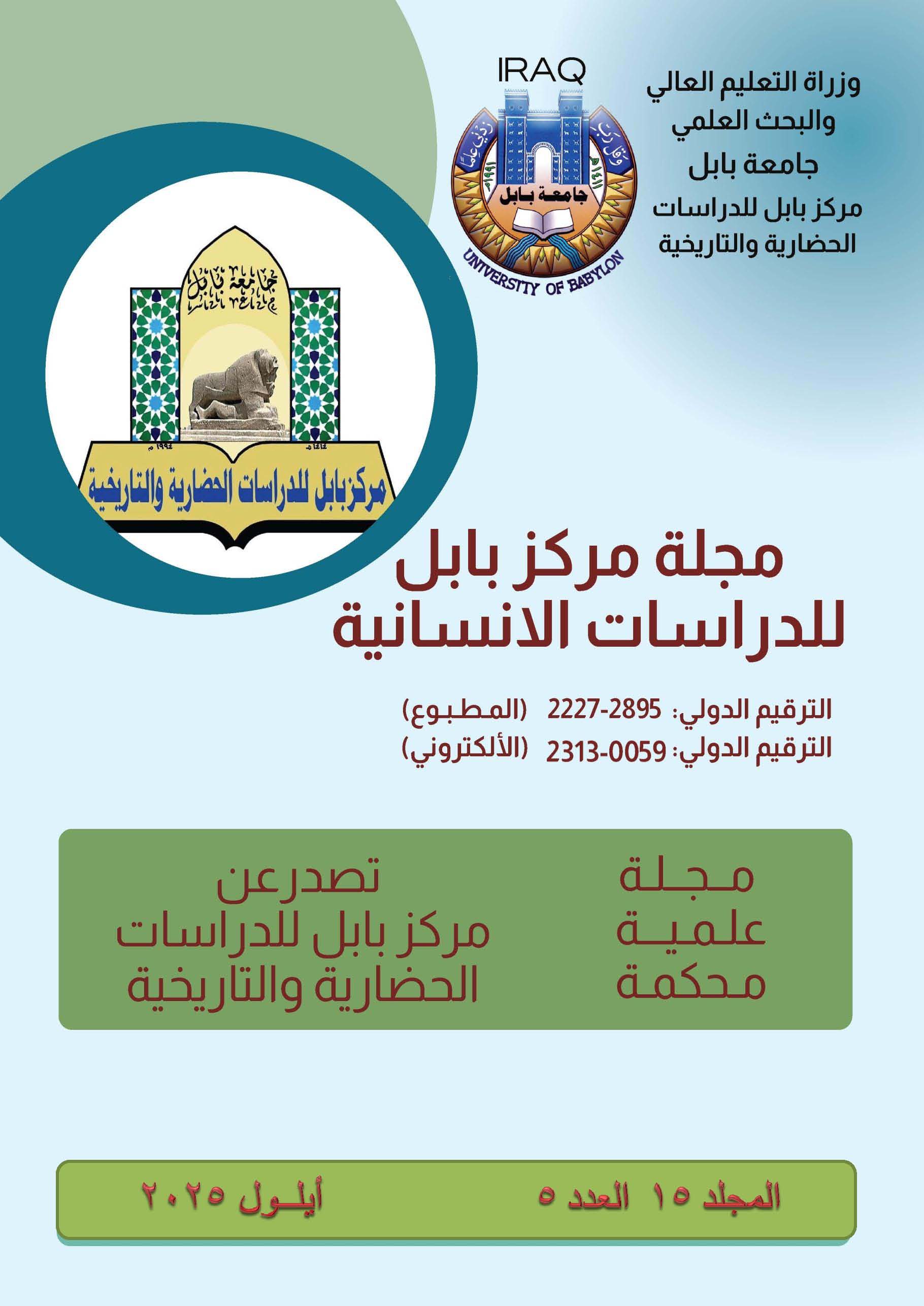Abstract
The Diwans did not arise at the same time, but rather arose in different historical eras, some dating back to the Rashidun era (11-41 AH/ 623-661 AD), some dating back to the Umayyad era (41-132 AH/ 662-750 AD), and a third section dating back to the era. The first Abbasid (132-232 AH/ 750-847 AD).
There are many The Diwans in the Islamic State, which varied according to their specialization and fields of work, and were divided into: The Diwans concerned with financial affairs, The Diwans concerned with judicial affairs and rulings, and The Diwans related to military and security aspects (the subject of the research).
There are (three) collections of The Diwans related to military and security matters, namely: (Diwan Al-Soldad, Diwan Al-Mawali and Boys, and Diwan Al-Mail). The Diwan al-Jund looked into the affairs of the Abbasid soldiers. It recorded in its books (their names, characteristics, and livelihoods, as well as the characteristics of the animals owned by the soldiers), and the Diwan looked into the distribution of livelihoods and their dates.
As for (Diwan Al-Mawali and the Boys), he was looking into increasing the number of boys, and choosing whom to buy from them, under conditions that he would find in his own way. As for the third Diwan, it is (the postal Diwan). The Abbasids took care of it and organized it to be an effective tool of government. Postal purposes developed in this era and became a means of administrative supervision, as well as surveying the situation. The Diwan served military purposes, and was also used in emergency situations to transport travelers. .
There are many The Diwans in the Islamic State, which varied according to their specialization and fields of work, and were divided into: The Diwans concerned with financial affairs, The Diwans concerned with judicial affairs and rulings, and The Diwans related to military and security aspects (the subject of the research).
There are (three) collections of The Diwans related to military and security matters, namely: (Diwan Al-Soldad, Diwan Al-Mawali and Boys, and Diwan Al-Mail). The Diwan al-Jund looked into the affairs of the Abbasid soldiers. It recorded in its books (their names, characteristics, and livelihoods, as well as the characteristics of the animals owned by the soldiers), and the Diwan looked into the distribution of livelihoods and their dates.
As for (Diwan Al-Mawali and the Boys), he was looking into increasing the number of boys, and choosing whom to buy from them, under conditions that he would find in his own way. As for the third Diwan, it is (the postal Diwan). The Abbasids took care of it and organized it to be an effective tool of government. Postal purposes developed in this era and became a means of administrative supervision, as well as surveying the situation. The Diwan served military purposes, and was also used in emergency situations to transport travelers. .
Keywords
Diwan al-Jund
Diwan al-Mawali and lads
Diwan al-Ma’il.
Diwans
military and security diwans
the first Abbasid era
Abstract
لم تنشأ الدواوين في وقت واحد، بل نشأت في حُقب تاريخية مختلفة، يرجع بعضها إلى العهد الراشدي (11-41هـ/623-661م)، ويرجع بعضها إلى العصر الأموي (41-132هـ/662-750م)، كما يرجع قسم ثالث إلى العصر العباسي الأول (132-232هـ/ 750-847م).
يوجد العديد من الدواوين في الدولة الإسلامية، إذ تنوعت بحسب اختصاصها وحقول عملها، وقسمت إلى: الدواوين المختصة بالشؤون المالية، والدواوين المعنية بشؤون القضاء والأحكام، والدواوين المتعلقة بالنواحي العسكرية والأمنية (موضوع البحث).
تتناول الدواوين المتعلقة بالنواحي العسكرية والأمنية (ثلاثة) دواوين، هي: (ديوان الجند، وديوان الموالي والغلمان، وديوان البريد). كان (ديوان الجند) ينظر في الشؤون الجند العباسي، فكانت تسجل في دفاتره (أسماؤهم، وصفاتهم، وأرزاقهم، كما تسجل فيه صفات الدواب التي يمتلكها الجند)، وينظر الديوان في توزيع الأرزاق ومواعيدها. أما (ديوان الموالي والغلمان) فكان ينظر في الاستكثار من الغلمان، وفي انتقاء من يشتريه منهم، بشروط يستجيدها على طريقته الخاصة. أما الديوان الثالث فهو (ديوان البريد) فقد عُني العباسيون به ونظموه ليكون أداة فعالة من أدوات الحكم، وقد تطورت أغراض البريد في هذا العصر فأصبح وسيلة للإشراف الإداري، فضلًا عن استطلاع الأوضاع، وكان الديوان بخدم الأغراض العسكرية، كما استخدم في الحالات الطارئة لنقل المسافرين.
يوجد العديد من الدواوين في الدولة الإسلامية، إذ تنوعت بحسب اختصاصها وحقول عملها، وقسمت إلى: الدواوين المختصة بالشؤون المالية، والدواوين المعنية بشؤون القضاء والأحكام، والدواوين المتعلقة بالنواحي العسكرية والأمنية (موضوع البحث).
تتناول الدواوين المتعلقة بالنواحي العسكرية والأمنية (ثلاثة) دواوين، هي: (ديوان الجند، وديوان الموالي والغلمان، وديوان البريد). كان (ديوان الجند) ينظر في الشؤون الجند العباسي، فكانت تسجل في دفاتره (أسماؤهم، وصفاتهم، وأرزاقهم، كما تسجل فيه صفات الدواب التي يمتلكها الجند)، وينظر الديوان في توزيع الأرزاق ومواعيدها. أما (ديوان الموالي والغلمان) فكان ينظر في الاستكثار من الغلمان، وفي انتقاء من يشتريه منهم، بشروط يستجيدها على طريقته الخاصة. أما الديوان الثالث فهو (ديوان البريد) فقد عُني العباسيون به ونظموه ليكون أداة فعالة من أدوات الحكم، وقد تطورت أغراض البريد في هذا العصر فأصبح وسيلة للإشراف الإداري، فضلًا عن استطلاع الأوضاع، وكان الديوان بخدم الأغراض العسكرية، كما استخدم في الحالات الطارئة لنقل المسافرين.
Keywords
الدواوين، الدواوين العسكرية والأمنية، العصر العباسي الأول، ديوان الجند، ديوان الموالي والغلمان، ديوان البريد
